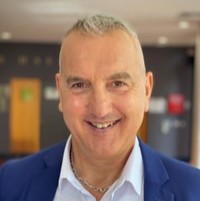Developing
About us
On the mission
for new therapies
At Vitaleon Pharma, we are dedicated to pioneering advancements in fertility and overall wellbeing. Our mission is to not only spark the miracle of life but to ensure its longevity and vitality. By improving fertility, ensuring healthy telomere extension in newborns and combating the challenges of NASH, we’re striving for a world where every new life starts stronger and every life journey is healthier.

Laszlo Bicskei - CEO
Laszlo Bicskei, serving as the CEO, boasts a diverse and extensive background in both the scientific and business realms. He holds an M.Sc. in Biomedical Engineering from Semmelweis University and an M.Sc. in Computer Sciences, specializing in Artificial Intelligence, from the Budapest University of Technology and Economics. His early career included involvement in research at the Institute of Experimental Medicine of the Hungarian Academy of Sciences and in developing biomedical algorithms at Innomed Medical Inc. and General Electric Healthcare.
During his time as a Marie Curie fellow at University College London he dedicated four years to Computational Neuroscience research. He then moved into the business sector, working as a Management Consultant in a prominent international pharmaceutical consultancy in London, leading a variety of local and global projects, collaborating with top-tier pharmaceutical companies and addressing challenges across multiple therapy areas.
In 2016, Laszlo transitioned to X-Ventures Venture Capital, overseeing the fund’s life sciences investments. He was also serving as the CEO of Humeltis, where he has been pivotal in advancing an innovative biotechnology that provides personalized cancer therapy recommendations using proprietary 3D tissue engineering technology.
Advisors
scientific experts
on our advisory team

Rebecca robker
ph.d.
Professor Robker is an NHMRC Senior Research Fellow. Her Ovarian Cell Biology Research Group sits within the School of Medicine and Faculty of Health Sciences at The University of Adelaide. Her lab is also part of the Robinson Research Institute, where she is a Leader of the Early Origins of Health Theme, which is identifying biological mechanisms by which events in early life, including at conception, influence later health.
Dr Robker received her Bachelor of Science from the University of Texas at Austin and her PhD in
Biomedical Science from Baylor College of Medicine (Houston TX). Her PhD studies discovered novel mechanisms by which hormones control ovarian cell proliferation (Nature 1996; Mol Endo 1998) and identified long sought proteases that control ovulation (PNAS 2000). Dr Robker undertook an NIH Postdoctoral Fellowship in Leukocyte Biology (Baylor College of Medicine) where her studies revealed that leukocytes are resident in adipose tissue and activated by high fat diet (Obesity 2004; AJP- Cell Physiol 2006).
In 2003, Dr Robker re-located to the University of Adelaide in order to join its unparalleled
concentration of leaders in the fields of Reproductive Medicine and Developmental Origins of Health and Disease (DoHaD). Here her work demonstrated that ovarian somatic cells and oocytes are affected by obesity (Endocrinology 2008, Journal of Clinical Endocrinology & Metabolism 2009). Dr Robker’s team has further discovered the mechanisms by which lipid metabolism and lipid excess affect oocyte developmental potential (Biology of Reprod 2010, Mol Endo 2010), and most recently found that obesity-induced alterations in oocyte mitochondria persist into offspring tissues (Development 2015), revising our understanding of developmental origins of health.

Kalman Tory
m.d, ph.d.
Kalman Tory, M.D., Ph.D., our medical advisor received his M.D. and Ph.D. degrees at Semmelweis University, Budapest. After a short clinical training he joined the Institute of Drug Research, Budapest and took part in the development of three new antitumor drug candidates. He had a fellowship at the Laboratory of Immunobiology at NCI, Frederick, MD, US, then at the same institute he took part in the Human Genome project as a group leader for three more years. He worked on the building of a genetic map of human chromosome 3, furthermore on the cloning and analysis of the von Hippel-Lindau (VHL) tumor suppressor gene.
He continued his work on VHL and renal cancer biology at DKFZ, Heidelberg and RWTH, Aachen, Germany. After returning to Hungary, he joined Biorex Ltd and took part in the pharmacological development of new antidiabetic agents. Later he served as a senior adviser at Sanofi for one year. He moved to N-Gene RD Ltd. where he took part in the development of hydroxylamine type drug candidates in various therapeutic directions. He has published more than 60 papers in peer-reviewed journals, and he is the inventor of several pharmacological patents.

Mark A Febbraio
ph.d.
Mark A Febbraio
Professor Mark Febbraio is a National Health and Medical Research Council of Australia Research Investigator and the Head of the Cellular and Molecular Metabolism Laboratory within the Drug Discovery Program at Monash Institute of Pharmaceutical Sciences, Monash University Australia. He is the Founder and Chief Scientist of Celesta Therapeutics and a scientific advisor for Vitaleon Pharma. His research is focussed on understanding mechanisms associated with exercise, obesity, type 2 diabetes and cancer and his aim is to develop novel drugs to treat lifestyle related diseases. He has authored over 280 peer reviewed papers in leading journals and has over 50,000 career citations. Throughout his career, he has won many prestigious awards including the Australian Physiological Society (AuPS) AK McIntyre Prize (1999), the Kellion Award for the Australian Diabetes Society (2017), The Eureka Scientific Prize (2020), The GSK Award for Research Excellence (2020), The Endocrinology Society UK International Medal (2021) the Kirsten and Freddy Johansen Rigshospitalet International Award, Denmark (2022) and The AuPS Invited Lecture and Medal (2024).
Contact us
Get in touch
Want to know more about our research?
Let’s get in touch!
- info@vitaleonpharma.com
